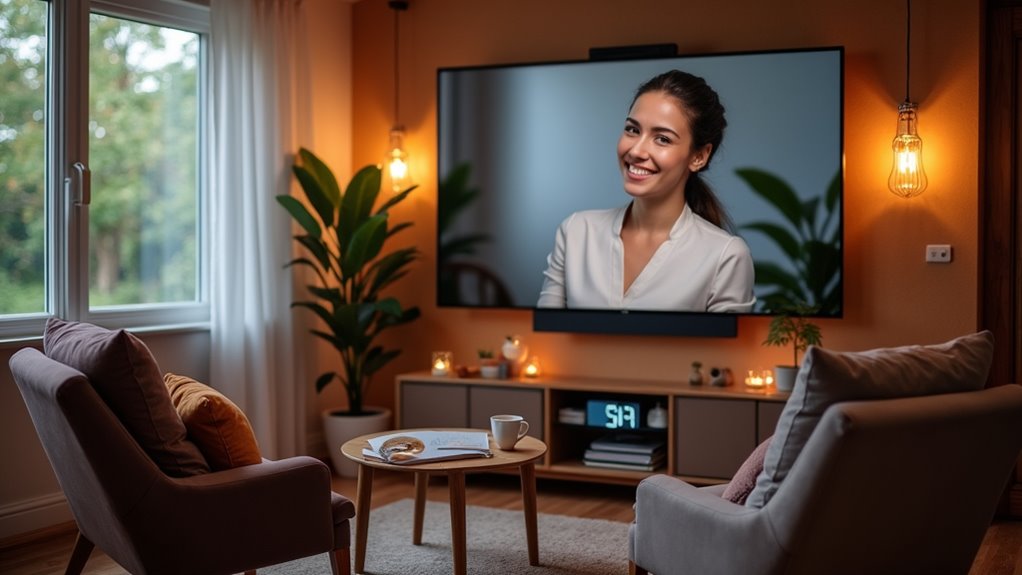You’ll experience a transformed therapeutic environment that integrates traditional talk therapy with cutting-edge technology and holistic approaches. Your sessions will likely incorporate AI-driven insights from wearable devices, mindfulness practices, and culturally-informed healing methods. Expect personalized treatment plans that combine somatic awareness, breathwork, and digital tools for between-session support. Your therapist will blend evidence-based techniques with ancestral wisdom and spiritual elements, creating an extensive pathway to improved mental wellness.
The Integration of Mind-Body Wellness Approaches

The integration of mind-body wellness approaches represents a fundamental shift in individual psychotherapy, moving beyond traditional talk therapy to encapsulate a more holistic treatment paradigm. You’ll experience sessions that combine traditional psychotherapy with somatic dialogue frameworks, incorporating breathwork, yoga, and biofeedback to address both psychological and physiological manifestations of distress. Physical activities like recreational sports participation can be recommended as part of your therapeutic journey. Mindfulness practice helps patients develop deeper self-awareness while reducing feelings of overwhelm during sessions.
Your therapist will guide you through embodied awareness practices, helping you identify how emotional challenges manifest physically. This approach actively engages the whole person system, addressing mental, physical, and spiritual dimensions simultaneously. This hybrid approach follows the 3-R framework (Relief, Resolve, Realization) and utilizes real-time physiological monitoring to inform treatment strategies. You’ll learn to recognize and regulate your body’s stress responses through mindfulness techniques, while neuroplasticity-based exercises create new neural pathways for lasting change. Research shows these integrated approaches match or exceed traditional interventions in treating anxiety, depression, and trauma.
Personalized Technology-Enhanced Treatment Plans
As mental health care evolves rapidly, personalized technology-enhanced treatment plans now form the cornerstone of modern psychotherapy. You’ll experience a seamless integration of AI-driven clinical insights through wearable devices that monitor your physiological responses and mood patterns between sessions. Your therapist will utilize sophisticated analytics to craft interventions tailored to your specific needs. Comprehensive holistic care models now integrate traditional talk therapy with meditation, yoga therapy, and somatic experiencing techniques. Therapists ensure treatment integrity through research data planning that tracks outcomes and maintains secure records of your progress. The integration of real-time support through AI-powered tools provides immediate assistance whenever you need it between sessions.
The system’s predictive early intervention capabilities will alert your care team to potential crisis triggers before they escalate, enabling proactive support through hybrid digital-therapeutic approaches. You’ll have access to customized CBT modules, VR exposure therapy, and mindfulness training apps that complement your in-person sessions. This technology-enhanced approach guarantees you receive continuous support while maintaining the essential human connection with your therapist, all within a secure, encrypted environment that protects your privacy.
Cultural and Spiritual Elements in Modern Therapy

Within your therapeutic [path] by 2025, you’ll encounter a seamless integration of ancestral healing practices that honor your cultural lineage while maintaining evidence-based psychological principles. You’ll experience therapy spaces specifically designed to accommodate sacred rituals and spiritual practices, complete with adaptable environments that support both traditional healing modalities and contemporary therapeutic techniques. These culturally-informed spaces will enable you to access deeper layers of healing through the intentional bridging of ancient wisdom with modern psychological approaches, supported by therapists trained in both Western and indigenous healing traditions. The incorporation of Islamic rituals and community-oriented practices will enhance therapeutic outcomes for Muslim clients. Therapists will employ bio-psycho-social factors alongside spiritual elements to create comprehensive treatment approaches. The focus on understanding your existential concerns will be central to addressing mental health and promoting overall well-being.
Ancestral Healing Meets Therapy
Modern psychotherapy has undergone a profound transformation through the integration of ancestral healing practices, creating a powerful synergy between evidence-based clinical methods and cultural-spiritual traditions.
In your 2025 therapy sessions, you’ll experience a blend of conventional techniques like CBT augmented by intergenerational trauma resolution practices. Research from the 2019 Frontiers in Psychology study confirms that addressing ancestral wounds dramatically improves resilience and emotional well-being. Through cultural identity reclamation work, you’ll engage in rituals and spiritual reconnection practices that amplify therapeutic outcomes while honoring your lineage. With self-paced learning components available, clients can engage in personal healing work between sessions.
This integrated approach addresses both mind and body, as conscious ancestral connections correlate with improved physical health. You’ll benefit from culturally responsive tools and somatic practices that help release generational patterns stored in ancestral memory. The combination of modern therapeutic tools with ancestral practices creates a comprehensive healing journey that effectively addresses both present-day challenges and deep-rooted ancestral trauma.
Sacred Spaces Within Sessions
Your 2025 therapy sessions will transcend traditional clinical boundaries by integrating sacred elements that honor diverse spiritual and cultural frameworks. You’ll find therapists trained in sacred ritual facilitation, incorporating both Eastern and Western spiritual practices within evidence-based treatments.
The spiritual sanctuary design of your therapy space will reflect this integration, allowing for meditation, prayer, or mindfulness practices that align with your beliefs. Soft lighting and altars create an atmosphere of intentional calm and safety in modern therapy spaces. Your therapist will skillfully blend traditional psychotherapy with cultural adaptations, whether that’s through CBT infused with religious texts or behavioral activation through liturgical practices. This approach helps create an environment focused on stress reduction techniques while honoring your spiritual path. Many therapists now offer communal healing sessions alongside individual treatment, reflecting a shift toward more collective spiritual experiences. They’ll respect your spiritual perspective while maintaining professional boundaries, ensuring treatment remains clinically sound. You’ll experience a therapeutic environment where cultural symbols, sacred texts, and mindfulness techniques work together to support your healing expedition.
Trauma-Informed Care and Nervous System Regulation
Three foundational shifts in trauma treatment have revolutionized individual psychotherapy: trauma-informed care principles, nervous system regulation techniques, and integrated somatic approaches. You’ll experience evidence-based workforce adaptation through clinicians trained in SAMHSA’s four pillars, ensuring a healing-focused environment that prioritizes your safety and prevents re-traumatization. Quality improvement strategies now integrate somatic interventions like Linda Thai’s NSR therapy and Polyvagal applications. Supporting parents and caregivers through family-centered approaches has become essential to breaking cycles of intergenerational trauma.
| Approach | What You’ll Experience | Expected Outcomes |
|---|---|---|
| Trauma-Informed Care | Safe, predictable sessions | Strengthened therapeutic alliance |
| Nervous System Regulation | Body-based interventions | Heightened emotional stability |
| Somatic Processing | Mindful movement work | Liberated trauma patterns |
| Integration Techniques | Incremental exposure | Sustained nervous system balance |
Your therapist will implement these approaches while monitoring your comfort level, adjusting techniques based on your unique nervous system responses and trauma history.
Hybrid In-Person and Virtual Session Options

Nearly two-thirds of psychotherapy providers now offer hybrid session models, blending traditional in-person counseling with virtual options to optimize accessibility and treatment effectiveness. You’ll experience customized session personalization through AI-driven matching algorithms that align you with therapists based on your specific needs and preferences. Provider collaboration across platforms guarantees seamless care coordination whether you’re meeting in-office or connecting remotely.
You can expect flexible scheduling that combines in-person visits with digital check-ins, supported by AI-enhanced mood tracking and guided journaling tools. Real-time insurance verification and streamlined billing processes make hybrid care more accessible, while integrated progress dashboards help you monitor your therapeutic path. Advanced platforms now offer text, voice, and video options, allowing you to adapt communication methods based on your comfort level and immediate needs.
Holistic Health Monitoring and Tracking
Your future psychotherapy sessions will incorporate advanced wearable technology that seamlessly integrates physical and mental health data, allowing your therapist to monitor important signs, sleep patterns, and emotional indicators in real-time. You’ll benefit from AI-driven analytics that establish clear connections between your lifestyle choices and mental well-being, while personalized dashboards track your progress across multiple wellness dimensions. Your therapeutic course will be improved by smart monitoring systems that automatically adjust treatment recommendations based on your unique mind-body responses and behavioral patterns.
Wearable Data Integration Tools
Modern wearable technology has revolutionized the integration of biometric data into individual psychotherapy sessions, enabling continuous monitoring of imperative health indicators. You’ll experience real-time tracking of your physiological responses through skin-adherent devices that sync directly with your therapist’s dashboard. With sturdy data privacy safeguards in place, these tools offer treatment adherence monitoring while maintaining your confidentiality.
| Feature | Benefit |
|---|---|
| Biometric Tracking | Real-time stress and anxiety monitoring |
| EHR Integration | Seamless health data correlation |
| Alert Systems | Immediate therapist notification of concerns |
| Progress Analytics | Data-driven treatment adjustments |
| Customized Feedback | Personalized therapeutic interventions |
Your therapist will receive instant notifications about significant changes in your biomarkers, allowing for timely interventions and treatment modifications. This integration enables more precise, personalized therapeutic approaches based on your unique physiological patterns and responses.
Mind-Body Progress Metrics
Pioneering advancements in holistic health tracking have transformed the panorama of psychotherapy assessment through all-encompassing mind-body progress metrics. Through embodied experience mapping and sensory awareness measurement, you’ll engage with sophisticated tracking systems that quantify your therapeutic expedition.
- Your cognitive optimization will be monitored through attention span metrics and emotional regulation capacity measurements.
- Advanced biofeedback systems will track your breath-energy synchronization and musculoskeletal alignment during movement therapies.
- Stress response patterns will be assessed via HRV monitoring and cortisol level trends.
- Neural adaptations will be documented through fMRI scans, revealing changes in gray matter density and emotion regulation neurocircuitry.
These metrics will provide precise, data-driven insights into your progress, enabling your therapist to tailor interventions based on objective measurements of your mind-body integration.
Personalized Wellness Tracking Systems
Building upon the foundation of mind-body metrics, holistic wellness tracking systems now integrate multiple dimensions of physical and psychological health into a unified monitoring framework. You’ll experience AI-based risk analytics that combine your genetic predispositions, real-time biometrics, and psychological markers to create dynamic treatment plans. Through advanced wearables, your therapist can monitor stress biomarkers, sleep patterns, and emotional fluctuations between sessions.
Remote monitoring solutions will connect your daily activities to your therapeutic pathway, offering predictive insights about potential mental health challenges before they escalate. Your encrypted data streams from multiple platforms will converge to create a comprehensive wellness profile, enabling your therapist to make evidence-based adjustments to your treatment. This integration guarantees that environmental factors and lifestyle changes are continuously factored into your personalized care strategy.
Enhanced Therapeutic Relationships and Boundaries
Effective therapeutic relationships in 2025 will require therapists to establish and maintain increasingly sophisticated boundaries that balance professional distance with genuine connection. You’ll experience more structured yet culturally adaptable therapeutic frameworks designed to navigate complex ethical dilemmas and guarantee interprofessional collaborations.
Key developments you’ll encounter include:
- HIPAA-compliant digital platforms with preset communication windows and emergency protocols
- Cultural competency-driven boundary systems that respect your community values while maintaining professional standards
- Transparent documentation of all boundary agreements and dual relationship management strategies
- Real-time wellness tracking integrated with boundary preservation protocols
These advancements will certify your therapeutic experience remains professionally contained while acknowledging your unique cultural context and digital connectivity needs, creating a more secure and effective treatment environment.
Accessibility Solutions and Payment Options
Three transformative developments will reshape therapy accessibility and payment structures by 2025: integrated digital platforms, expanded insurance coverage, and community-based care models.
You’ll find improved payment flexibility options through sliding scale fees, Medicare expansions, and insurance parity for virtual services. Digital platforms will offer graduated pricing tiers tied to app usage, while teletherapy reduces geographic barriers to care. Pre-session questionnaires and AI-powered assessments will streamline your initial engagement.
Community-based delivery models will revolutionize access through mobile clinics, school-based programs, and peer support specialists. You’ll benefit from community health workers who address social determinants affecting your mental health passage. Brief group interventions and single-session therapy options will reduce waiting times, while maintaining quality care through outcome tracking and personalized approaches.
Multi-Modal Treatment Combinations
Through careful integration of multiple therapeutic approaches, you’ll experience an extensive treatment strategy that combines established methodologies like CBT with physiological interventions and behavioral practices. These collaborative treatment frameworks utilize data-driven personalization to optimize your mental health outcomes.
Your therapist will implement a comprehensive approach that includes:
- Advanced biomarker monitoring to fine-tune medication and therapy combinations
- Integration of mindfulness techniques with traditional cognitive restructuring
- Tech-augmented assessment tools for real-time progress tracking
- Multimodal evaluation methods to address biological, cognitive, and interpersonal factors
This scientifically-validated combination of treatments guarantees you receive precisely targeted interventions, while maintaining strict ethical standards and privacy protocols. Your customized care plan will evolve based on continuous assessment and therapeutic response data.
Evidence-Based Innovation in Clinical Practice
Modern psychotherapy stands at the frontier of evidence-based innovation, where clinical expertise meets cutting-edge technology. You’ll find your therapy sessions enriched by extended reality applications that enable precise exposure treatments and skill-building exercises within controlled virtual environments. These evidence-based tools complement traditional CBT approaches while maintaining therapeutic effectiveness.
Patient-clinician collaboration reaches new depths through AI-assisted data analysis, helping you track patterns in your emotional well-being and behavioral changes. You’ll actively participate in examining your progress using interactive platforms that merge teletherapy capabilities with real-time monitoring. Digital therapeutic tools reinforce your between-session practice, while standardized protocols guarantee you receive consistent, high-quality care that’s adaptable to your unique needs and cultural context.
Frequently Asked Questions
How Long Should I Wait Between Switching Therapists if Treatment Isn’t Working?
You should evaluate your therapy’s effectiveness after 6-8 weeks of regular sessions before considering a change. When finding new therapists, don’t wait longer than 8-12 sessions if you’re not seeing progress. Start managing shifts by securing referrals and reviewing insurance coverage while maintaining your current sessions. You can briefly overlap with a new therapist to test fit, but don’t extend unproductive treatment beyond three months maximum.
What Happens if I Experience a Crisis Between Scheduled Therapy Sessions?
If you’re experiencing a crisis between sessions, don’t wait; multiple immediate support options are available. You can contact your therapist’s crisis line, access 24/7 emergency services, or use online crisis platforms for urgent support. Most practices have crisis management protocols that include same-day appointments and flexible session scheduling. If you’re facing immediate safety concerns, head to the nearest emergency department or call emergency services immediately. Your well-being can’t wait.
Can Family Members Occasionally Join My Individual Therapy Sessions?
Yes, your relatives can occasionally join individual therapy sessions, but this requires advance planning and therapist approval. You’ll need to discuss session scheduling adjustments with your therapist, as family member attendance may alter the therapeutic dynamic. Most therapists allow periodic family involvement for specific therapeutic goals, such as improving communication or addressing shared concerns. Recall that your therapist will carefully evaluate how family participation aligns with your individual treatment objectives.
How Do Therapists Handle Romantic Feelings From Clients During Treatment?
Your therapist will handle romantic feelings professionally by directly addressing them while managing emotional boundaries. They’re trained to validate your feelings without reciprocation, using specific protocols for traversing attraction dynamics. You can expect them to discuss these feelings openly, helping you understand them as part of the therapeutic process. They’ll maintain clear professional boundaries, document discussions, and may involve supervision if needed to safeguard your treatment stays focused and effective.
What Personal Information About Clients Can Therapists Legally Share With Others?
Therapists must maintain strict client privacy concerns and follow rigorous confidential data handling protocols. You’ll find that they can’t share your personal information without your explicit written consent, except in specific situations required by law. These exceptions include imminent risk of harm to yourself or others, suspected abuse of vulnerable populations, or court orders. Even then, they’ll only disclose the minimum information necessary to guarantee safety and legal compliance.
















